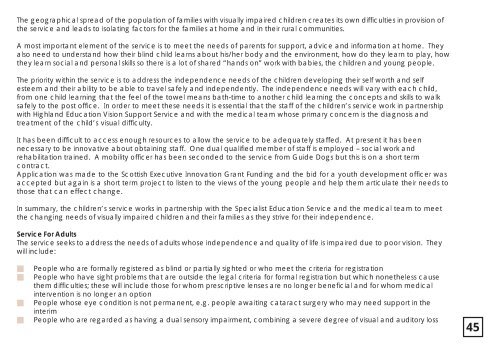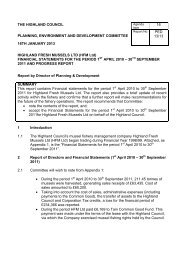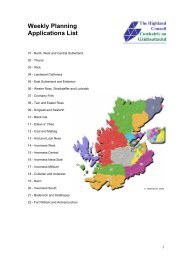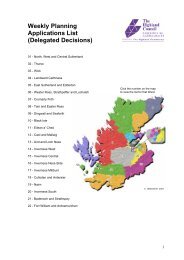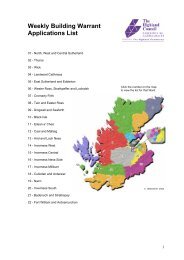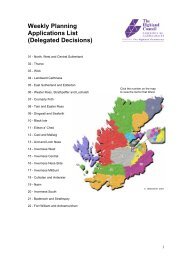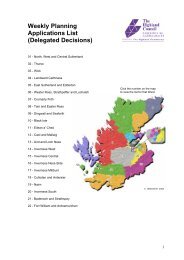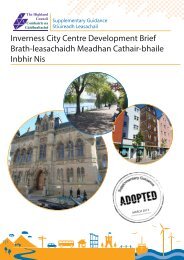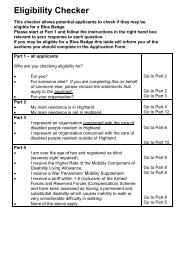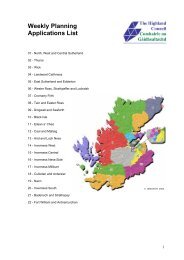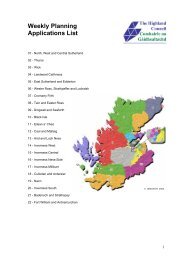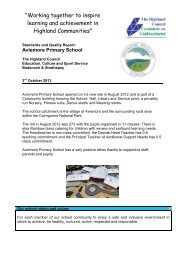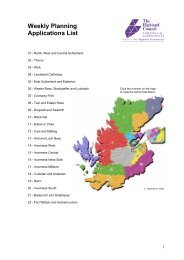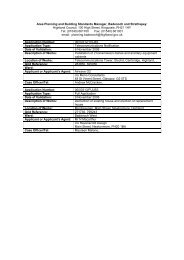A Single Strategy for Sensory Needs - The Highland Council
A Single Strategy for Sensory Needs - The Highland Council
A Single Strategy for Sensory Needs - The Highland Council
You also want an ePaper? Increase the reach of your titles
YUMPU automatically turns print PDFs into web optimized ePapers that Google loves.
<strong>The</strong> geographical spread of the population of families with visually impaired children creates its own difficulties in provision of<br />
the service and leads to isolating factors <strong>for</strong> the families at home and in their rural communities.<br />
A most important element of the service is to meet the needs of parents <strong>for</strong> support, advice and in<strong>for</strong>mation at home. <strong>The</strong>y<br />
also need to understand how their blind child learns about his/her body and the environment, how do they learn to play, how<br />
they learn social and personal skills so there is a lot of shared “hands on” work with babies, the children and young people.<br />
<strong>The</strong> priority within the service is to address the independence needs of the children developing their self worth and self<br />
esteem and their ability to be able to travel safely and independently. <strong>The</strong> independence needs will vary with each child,<br />
from one child learning that the feel of the towel means bath-time to another child learning the concepts and skills to walk<br />
safely to the post office. In order to meet these needs it is essential that the staff of the children’s service work in partnership<br />
with <strong>Highland</strong> Education Vision Support Service and with the medical team whose primary concern is the diagnosis and<br />
treatment of the child’s visual difficulty.<br />
It has been difficult to access enough resources to allow the service to be adequately staffed. At present it has been<br />
necessary to be innovative about obtaining staff. One dual qualified member of staff is employed – social work and<br />
rehabilitation trained. A mobility officer has been seconded to the service from Guide Dogs but this is on a short term<br />
contract.<br />
Application was made to the Scottish Executive Innovation Grant Funding and the bid <strong>for</strong> a youth development officer was<br />
accepted but again is a short term project to listen to the views of the young people and help them articulate their needs to<br />
those that can effect change.<br />
In summary, the children’s service works in partnership with the Specialist Education Service and the medical team to meet<br />
the changing needs of visually impaired children and their families as they strive <strong>for</strong> their independence.<br />
Service For Adults<br />
<strong>The</strong> service seeks to address the needs of adults whose independence and quality of life is impaired due to poor vision. <strong>The</strong>y<br />
will include:<br />
<br />
<br />
<br />
<br />
People who are <strong>for</strong>mally registered as blind or partially sighted or who meet the criteria <strong>for</strong> registration<br />
People who have sight problems that are outside the legal criteria <strong>for</strong> <strong>for</strong>mal registration but which nonetheless cause<br />
them difficulties; these will include those <strong>for</strong> whom prescriptive lenses are no longer beneficial and <strong>for</strong> whom medical<br />
intervention is no longer an option<br />
People whose eye condition is not permanent, e.g. people awaiting cataract surgery who may need support in the<br />
interim<br />
People who are regarded as having a dual sensory impairment, combining a severe degree of visual and auditory loss<br />
45


